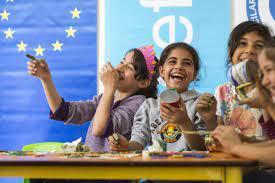
Every day, municipal police come in contact with children in need of protection, child victims or witnesses, and children as offenders of crimes. Therefore, as police officers, it is important to have good knowledge on how to interact with children, understand their situation, and respond to them in the best way possible to ensure their best interest, as well as their protection and that of society.
With an objective to effectively reinforce the capacity of the municipal police on child protection, the Ministry of Interior and Municipalities (MoIM), the European Union, and UNICEF launched the Trainer’s guide to be rolled out by the ISF Academy in an institutionalized and consistent manner as part of the trainings they provide to municipal police.
To date, municipal police have not benefited from institutionalized and consistent trainings focused on child protection. Nevertheless, as frontliners, it is important that they acquire solid knowledge and skills for engaging with children, as well as ensuring good practice during interviews and questioning, maintaining confidentiality protocols, and referring children to services.
“The police officers are generally the child’s first point of contact with the authorities. Because of the complexity of cases involving children, officers need to be well trained to handle them”, said Rein Nieland, Head of Cooperation at the EU Delegation to Lebanon. “The European Union in partnership with UNICEF continues to support the justice actors in Lebanon to be well-equipped to secure children’s rights”.
The Director-General of the Internal Security Forces Major General Imad Osman said: “Our strategic vision “together towards a safer society” can only be achieved by harnessing all efforts that are in the best interest of the child, and setting appropriate policies for this while focusing on building the capacity of our ISF officers, which remains the main means to reach the desired goal.
The training guide, developed in partnership with Himaya, followed an iterative process with extensive consultations with relevant stakeholders within the ISF, municipalities, and key child protection actors to ensure relevance, ownership and sustainability. Its structure and content are based on the information needs identified through municipal consultations, as well as feedback from UNICEF child protection partners.
“The way that children are treated by national justice, social welfare and security institutions is an issue of child rights and is integral to the achievement of the rule of law,” said Yukie Mokuo UNICEF representative in Lebanon. “UNICEF is working closely with MoIM to promote a child-friendly response to children who come into contact with the law and we would like to thank the ISF Directorate General, the ISF Academy and the EU for this positive collaboration, as we continue to work together to protect every child”.
Following the development of the Guide, a pool of trainers was established at the ISF Academy to conduct regular and standardized child-focused trainings for the municipal police. The trainers appointed by the ISF Academy have undergone a Training-of-Trainers that provided them with the needed knowledge and skills to move these trainings forward in an institutionalized and consistent manner.
Source: UNICEF
 FR
FR EN
EN AR
AR








